Happiness is the harmony between our susceptibilities and desires on one hand, and the objects with which they are made to conform on the other. It is attained by harmonizing our susceptibilities and desires with the Divine Will.
— Professor Lyman Atwater p1861
There’s one profoundly surprising element to our holiday tale this year: It was not written by O. Henry, whose The Gift of the Magi from 1905 pretty much retired the trophy for American Christmas stories, with all respect to the wondrous Jean Shepherd. In point of fact, our tale wasn’t written at all, but played out for real in the latter half of the 19th century, a rough and ready time in the United States, when men were men, the West was Wild, and you lived and died on your own smarts and pluck (according to Horatio Alger, anyway).
The setting was, of course, Princeton, and the Class of 1866 was, let’s face it, sparse. Matriculating at an anemic 74 bodies and gradually eroding to 52 over the course of a horrific war, they were remarkably unaffected in their prescribed studies as the world around them went to hell. On occasion, outside events would intrude: There was a bonfire that lasted 36 hours after Richmond fell on April 2, 1865; 22 days later the entire campus traveled to the new Princeton Junction to view Abraham Lincoln’s funeral train. Otherwise, they stole the clapper, they beleaguered the faculty, they made inappropriate noise, all per the norm. But they were few, and hardly whiz-bang scholars. One of the rare notables, Frederick Henry 1866, left after a year to pursue medicine, then became highly respected in Philadelphia doctor circles … but really had a claim to fame as the first perpetrator of the curveball, back at Princeton in the fall of 1863.
Buried squarely in the middle of the class (on graduation, GPAs then were published to the 10th of a point – his was 89.3) was a lad from Washington, D.C., by the name of Samuel Trust Lewis. When he entered as a sophomore in 1863 at the age of 19, the draft was already in force; whether he was physically disqualified or he bought his way out we don’t know, but he obviously didn’t volunteer for the war. He clearly could declaim: At Class Day in 1866 he was the Library Orator, giving a speech principally about a former librarian who had died; and at Commencement, he was one of 20 or so class orators, speaking on “Demigods.” Afterward, he returned to his home base of D.C. for five years to study law and then practice a bit, but that was not a wild success; by 1873 he felt compelled to seek greener legal pastures … in Wyoming. Now, I’m really not certain how many torts the bison were into, but there were about 10,000 people in the entire territory (one per 10 square miles), and Lewis’ first law practice failed. He got married along the way, ran for public office and lost, relocated (suggesting that there were at least two towns in Wyoming by then), and became well known for his drinking. In March of 1884, 38 years old, he died at Fort McKinney, 100 miles from the Little Bighorn; the local newspaper noted that “he was well-known in the community.” Even 32 years later, at its 50th reunion, the Class of 1866 had learned of his death, but had no idea of the circumstances.
If we reasonably regard Lewis’ career as inauspicious (while fully reflecting on our own shortcomings), we might consider the lesson of Henry Corwin, a particular hero of mine. The protagonist of a fine episode entitled The Night of the Meek during the second season of The Twilight Zone in 1960, written by the redoubtable Rod Serling (standing in for O. Henry) and portrayed by the magical Art Carney, Corwin is strikingly similar to my imaginary picture of Lewis in his last days: Drunk and despairing, except in a city tenement instead of the wilderness. Corwin, a sensitive dreamer, has the most spectacularly bad-fit job on Earth: As a department-store Santa, he hears the gift requests of children but can do nothing but weep over those poor neighbor kids who have no chance of having their own wishes fulfilled. Fired on Christmas Eve, he stumbles across an ugly burlap sack that proceeds to disgorge any gift request of anyone he meets. Although inhibited by the bureaucracy – the cops would like to know where he stole the loot – he perseveres and gleefully makes all his downtrodden compatriots happy, if only for a day, and never even thinks about anything for himself. As a reward of sorts, Corwin – in his scraggly rented Santa outfit – is allowed to actually become Santa Claus (yes, this is the precursor of Disney’s much lighter The Santa Clause). In the closing words of Serling, “There’s a wondrous magic to Christmas, and there’s a special power reserved for little people.”
Which brings us squarely back to Samuel Trust Lewis 1866. He had a special power, too, although in the plodding world of rote college learning I doubt it seemed so to him. His ability to decipher professors’ lectures and create meticulous notes was prodigious, and some of his instructors were, indeed, quite good at their jobs. In math he studied with the famed Professor John T. Duffield 1841, progenitor of a whole string of famous Princetonians (to include a University treasurer and an interim president of Princeton), and the result over 15 months is a stunning object. On the outside, a regular old black-marbled notebook about seven by 10 inches with a ratty spine, on the inside it becomes a work of art, and more.
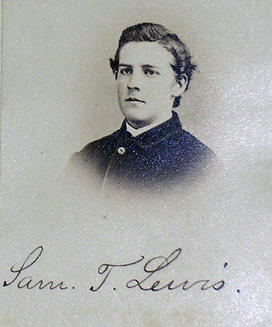
You smattering of remaining Palmer Methodists out there will read each of the 203 (!!) pages of this stunning work and try to figure out how the calligraphic magic was accomplished – could it possibly have been done in real time? Was the original work on the classroom blackboard remotely as clear? Did a mind destined for a Wyoming law office grasp much of it?
On it goes, through trigonometry, differential calculus, solid geometry, then analytical geometry, beautiful exposition after exposition, classic theorem after theorem, with perhaps one slight scratch-out or correction every 20 or 30 pages. By the time things wrap up in October of 1864 (while Grant and Sherman drove through the South), the sheer beauty of the work is completely overwhelming; the spontaneous valedictory quotation from Virgil, “Improbus Labor, omnia vincit,” seems to meld Lewis firmly with Caesar and Leibniz and Alger somewhere in the pantheon of wisdom. And then the florid inscription “Finis” seems to demand the reader stand up and cheer. It is not so much a tutorial time machine as a nonfiction novel, like In Cold Blood. It has an ethos and a moral. It is, quite simply, worth a holiday journey from wherever you may spend your prosaic hours to the poetic world of Princeton, simply to hold this in your hand, examine, and consider as O. Henry, Shepherd, and Serling have done, the wonders and mystery of our peculiar species.
Receiving this unintended gift from Samuel Trust Lewis – very possibly the only firsthand tangible remains of his life – is the moral equivalent of receiving a posh new smoking jacket from Henry Corwin, and certainly as discordant. Our burlap sack in this instance is the multifarious eBay (hey Meg, thanks again for the college!), which worked its magic for our good friends in the archives at Mudd Library, who this fall obtained and lovingly tidied up the notebook for our amazement. (Included as an unexpected bonus were looseleaf notes on moral philosophy with Professor Lyman Atwater (see above) and on mechanics, Professor Duffield’s specialty; Lewis’ exam in the latter was interrupted by the announcement that Lincoln had been killed.)
Each year, since my holiday column here stays online for a few weeks while the audience is festive and frivolous, I try to find a little gift in my burlap sack to augment the season, to help bring some joy to the world, whether it be through Fred Fox ’39 and his infectious spirit or President Harold Dodds *14 and his literary gifts to the sons of Old Nassau during their trials in World War II. To say that this year’s magical teleportation into the classrooms of 150 years ago comes from an unlikely source is a wild understatement, but perhaps our realization that the meek – the Samuel Trust Lewises of the world – each have much to offer is a generous gift in itself, and should humble us each day.
And so again, God bless us, every one.


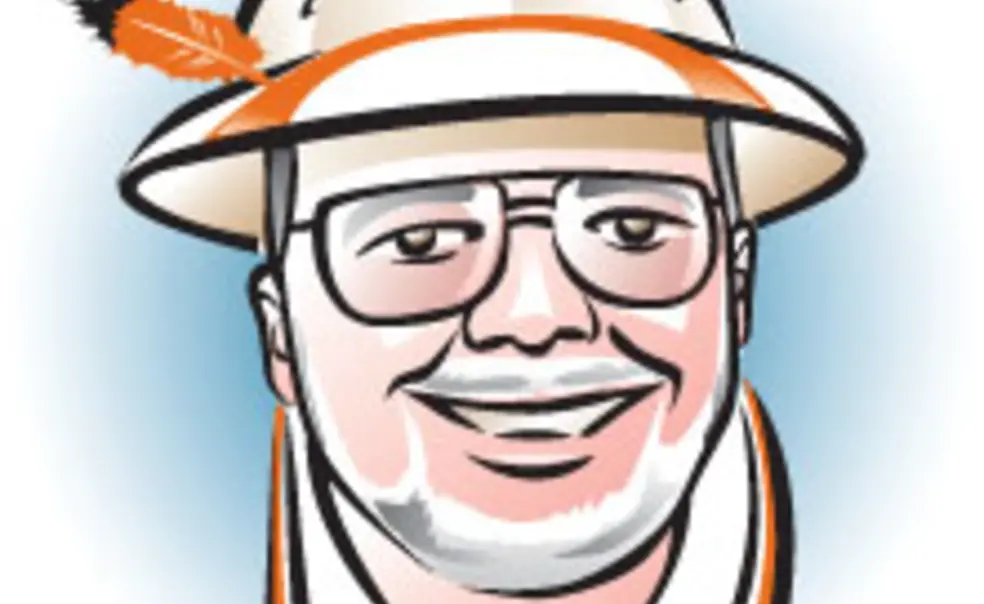
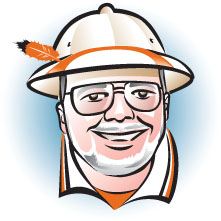
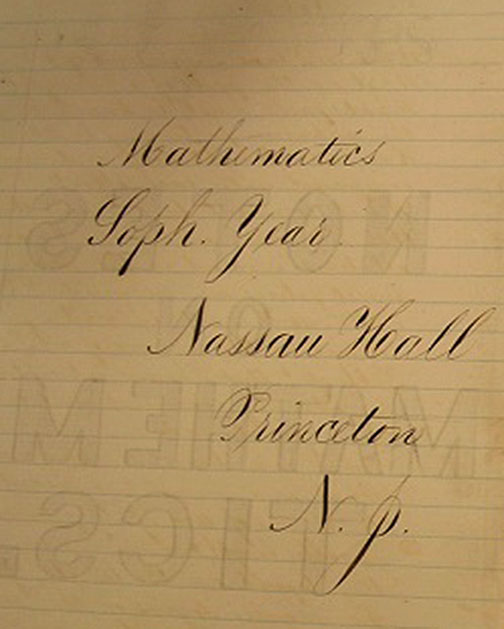
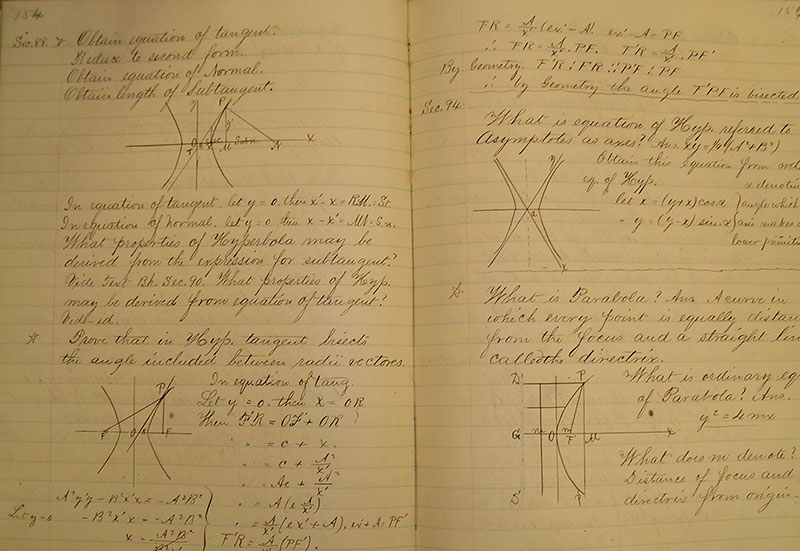
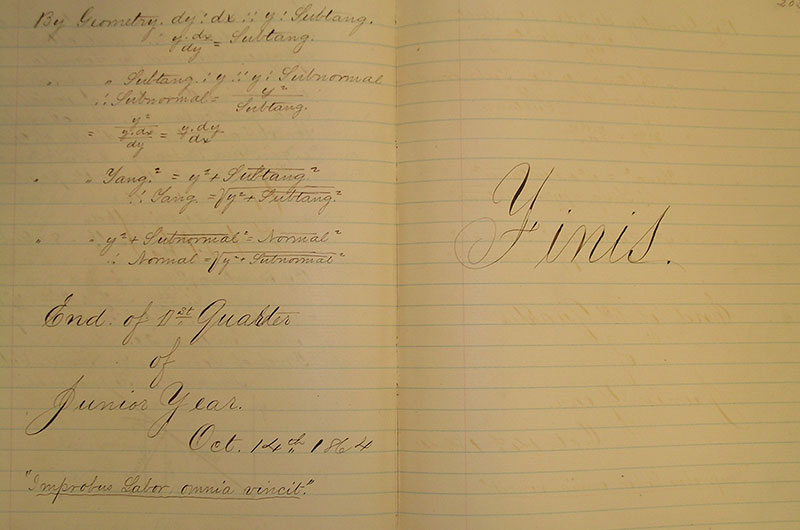









No responses yet